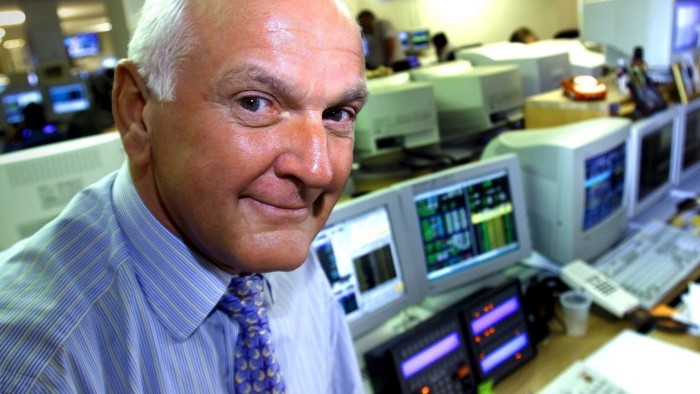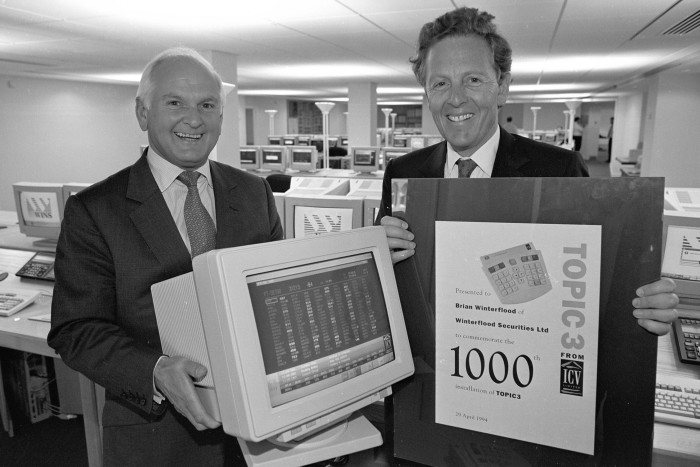Brian Winterflood, champion of small listed companies, 1937-2023

Brian Winterflood, who has died aged 86, was the undisputed godfather of smaller company share trading in Britain. A “jobber” by trade, as old school equity market makers preferred to be known, Winterflood witnessed six decades of profound and constant change in the City of London. This stretched from his first job filling inkwells at a stockbroker called Greener Dreyfus & Co in the early 1950s, to ushering in the ultra low latency world of modern day machine-driven equity order matching.
Utterly charming, albeit forthright, and ever-present on the never-ending circuit of City social and industry events, Winterflood was also known to be a fiercely demanding boss on his own dealing room floor, expecting a flawless trading performance from the ranks of sector specialists lined up at his eponymous market making firm, Winterflood Securities.
Wins, as it continues to be known by its trading handle, was founded by Winterflood in 1988, with the backing of the Union Discount Company of London. His previous trading house, County NatWest, had been formed amid the tumult of the Big Bang two years previously, when the fixed trading commissions of old were abolished, triggering a four-way merger frenzy among market makers, agency brokers, merchant banks, and their high street cousins, such as National Westminster.
County NatWest had quickly blown its reputation in one of the juicer financial scandals of the era, when its corporate financiers allegedly covered up the failure of a huge share issue, known as the Blue Arrow Affair. Seeing the writing on the wall, Winterflood simply set up his own firm, along with 36 other County traders.
The move was seen as rash at the time: standalone market making firms were deemed to be a thing of the past. But by then Winterflood already had 30 years under his belt as a hardened jobber at County’s predecessor, Bisgood Bishop & Co, and he knew the true value of two particular qualities in financial markets: a ready provision of liquidity, especially when the going in markets got tough, and also the importance of pristine execution of every trade.
Along the way, he had proved instrumental in establishing the Unlisted Securities Market as a trading platform for young businesses, so it was natural that when a new specialist jobber led by “Mr USM” launched, the focus would be on providing a market for all those trading small and medium-sized company shares.

“What Brian properly understood is that there were and are two tiers to the London equity market,” noted Spencer Crooks, a Wins original who spent 30 years at the firm. “At that time, all the big firms were chasing the big corporate names, they wanted the commissions in ICI, in Hanson. No one was looking after the regional brokers, no one was interested in the retail punters.”
Crucially, while Winterflood might have earned his stripes first as a market messenger — and later as an imposing physical presence on the old Stock Exchange floor, lining up “sellers on the left, buyers on the right!” — he embraced the move to electronic stock trading. Today, Winterflood Securities is a large bank of highly primed computer servers, handling order flow and providing constant two-way prices.
Within five years of start-up, the firm was under new ownership. “Union Discount had run into its own problems and needed an exit. Close Brothers had been brought in to find a buyer and simply decided to buy it themselves,” recalls David MacNamara, another Wins original who went on to become chief executive. “As young jobbers we all chose to sell our stock as soon as we could, stupidly. Brian didn’t.”
The London Stock Exchange, for many years, proved to be a particular Winterflood bête noire. The institution just wasn’t doing enough to support small, high growth companies, in his view. “Brian immersed himself completely in the fortunes of companies coming to market. He would present them with the ‘jobbers’ sheet’ after the first day of dealings, ready for framing,” recalls Crooks. “While we were still on the floor he would invite the management in and introduce him to the guys making the prices. It was central to his market ambitions. He was always pointing out that oaks started as acorns.”
That changed, at least a little, in time. The USM eventually morphed into the Alternative Investment Market and the new wave of management at the LSE clearly began to understand where Winterflood — who is survived by his wife, Doreen, and three children — was coming from.
As Xavier Rolet, who led the LSE for almost a decade through to 2018, puts it: “Brian was a pillar of the City because he understood its true purpose: to convene risk-takers to invest the capital gains of the past into the innovators of the future.” As such, Rolet says Winterflood understood the power of free equity markets over state-run investment to scale up high-growth small and medium-sized enterprises to societal relevance. “He was a tireless advocate of market-making, small and midsize enterprises and the convening power of the stock exchange to make it happen,” he adds. “He was the power behind the creation of AIM, to this day the only market-maker backed marketplace in the world designed to provide growth capital and liquidity to SMEs.”
Letter in response to this obituary:
City’s unicorn obsession / From Barry T Gamble, Banbury, Oxfordshire, UK
Comments